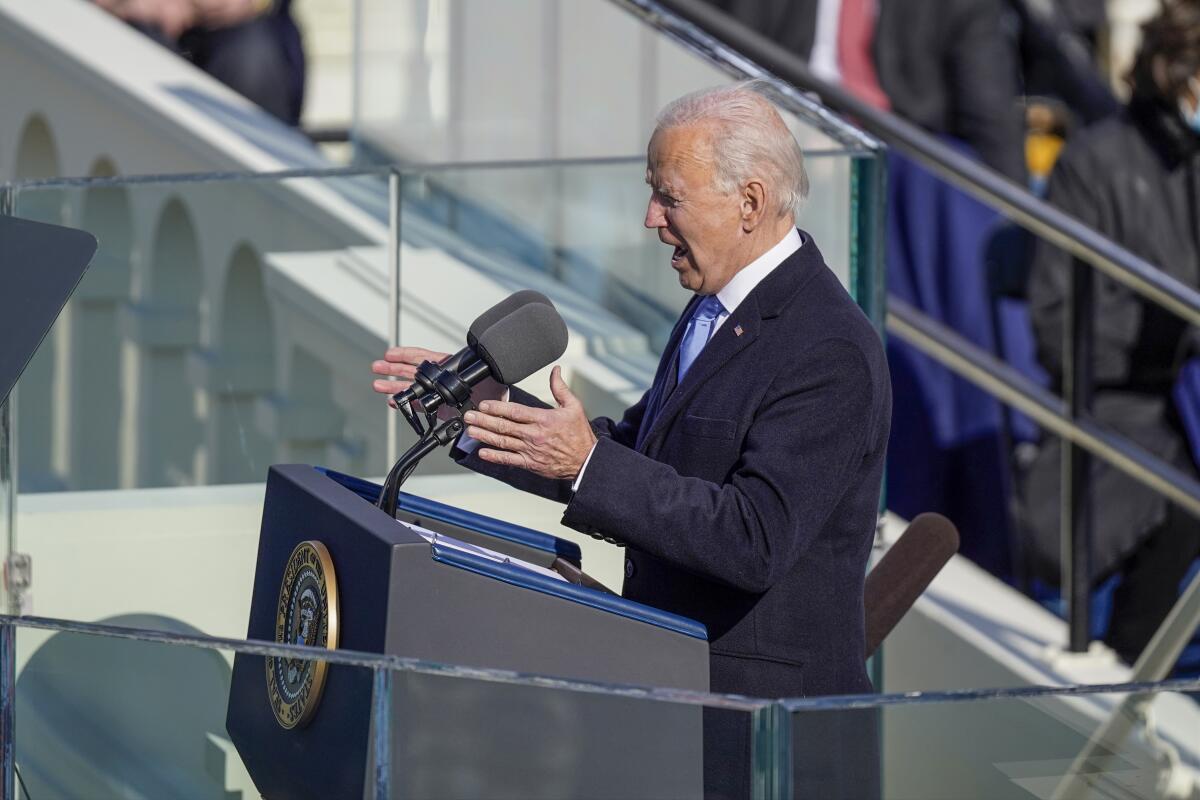America can breathe a sigh of relief — for a day

- Share via
Joe Biden began his presidency Wednesday with an inaugural address that hit all the right notes. Pledging to heal a nation more deeply divided than at any point since the Vietnam War — if not the Civil War — he reaffirmed his campaign promises to be a leader for all Americans.
Americans can, for one day, breathe a sigh of relief that the tumultuous Trump presidency, which reached an ugly climax in the Jan. 6 assault on the Capitol, has at last come to an end.
Biden bluntly acknowledged that “speaking of unity can sound to some like a foolish fantasy these days,” but he also pointed out the terrible consequences of its absence: “For without unity, there is no peace, only bitterness and fury. No progress, only exhausting outrage. No nation, only a state of chaos.” He urged Americans to reject both the idea that politics “has to be a raging fire, destroying everything in its path” and “the culture in which facts themselves are manipulated and even manufactured.” Noting that unity is “elusive” in a democracy, he did not once mention his predecessor or the complicity of some of the very lawmakers in his audience in President Trump’s effort to subvert democracy.
So unlike Trump’s address four years ago, with its bewildering (and inadvertently prophetic) talk of “American carnage,” Biden’s words came across as humble, even beseeching. “We must end this uncivil war that pits red against blue, rural versus urban, conservative versus liberal. We can do this if we open our souls instead of hardening our hearts,” he said.
For Americans who are desperate for a return to civility, to rational dialogue and to the prospect of a government that functions, these words were welcome, however great the obstacles that will have to be overcome.
Along with setting the right tone, the speech was notable in several respects. Outside of climate change, it scarcely mentioned foreign affairs — a poignant reflection of America’s weakened and self-absorbed condition these past few years. Only the second Catholic president, Biden quoted St. Augustine in describing the “common objects” that Americans share: “Opportunity, security, liberty, dignity, respect, honor and yes, the truth.” And in leading a silent prayer for the 400,000 Americans lost to COVID-19, Biden once again displayed the empathy and compassion that come not only from the wisdom of age, but from the grief of losing his first wife and two of his children, one in childhood, the other in adulthood.
Born during World War II — the deadliest single event for the United States until COVID-19 — Biden was elected to the Senate in 1972. He worked with eight presidents — from Richard Nixon to Barack Obama — before defeating a ninth, Trump. He will need to draw on wisdom born from experience while also clearing the path for a younger generation of leaders, as he started to do with the selection of Kamala Harris as vice president, the first Black American, Asian American and woman to occupy that office — and the highest ranking Californian in the land since Ronald Reagan’s presidency ended in 1989.
Befitting the urgency of the hour, Biden spent his first day as president taking executive action on the pandemic, creating a new coordinator for all federal COVID-19 efforts and mandating that anyone on federal property or traveling across state lines wear a mask. He also called on federal agencies to consider extending their eviction and foreclosure moratoriums until at least March 31 and the student loan payment freeze through Sept. 30, wisely seeking to continue two worthwhile Trump policies.
Other orders signed by Biden seek to erase the mistakes of the last four years, a task that sadly ranks as a top priority. For example, he called on federal agencies to undo or revisit Trump administration regulations that harmed public health or the environment, rolled back greenhouse gas regulations such as the vehicle fuel economy standards and opened more protected public lands to drillers and miners. He also scrapped a number of Trump’s more xenophobic immigration policies, including the efforts to end the Deferred Action for Childhood Arrivals program.
No question, the corrective steps are important. But Biden, with a razor-thin Democratic majority in the new Congress, also needs to get moving on creating more, better-paying jobs and fixing long-standing and seemingly intractable problems, such as our broken immigration system. We’re getting used to seeing new presidents sign a series of orders to reverse what their predecessors had done — and perhaps the reversals are inevitable in a country so bitterly divided. But it’s also an indictment of Congress for punting so much important policymaking to the White House. If lawmakers did the job the Constitution assigned to them, we could avoid at least some of the ideological whipsawing we’ve seen as administrations have changed.
For a day, Americans can take pride in the ritual handover of power that has taken place, despite the extraordinary sea of flags bearing witness rather than a crowd of citizens, and the backdrop of a Capitol that had been the scene of a violent rampage two weeks earlier. We join Biden in calling for America to “master this rare and difficult hour,” for the costs of not doing so are too painful to imagine.
More to Read
A cure for the common opinion
Get thought-provoking perspectives with our weekly newsletter.
You may occasionally receive promotional content from the Los Angeles Times.









